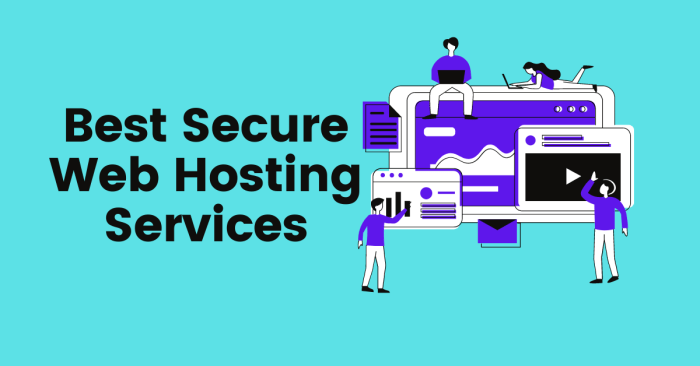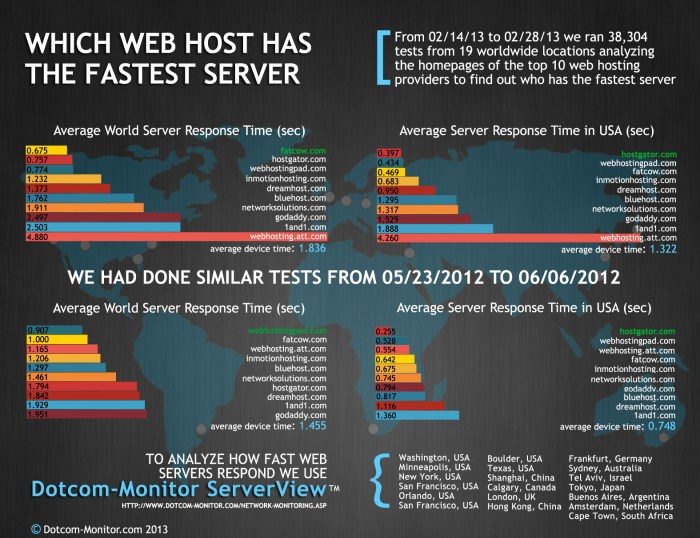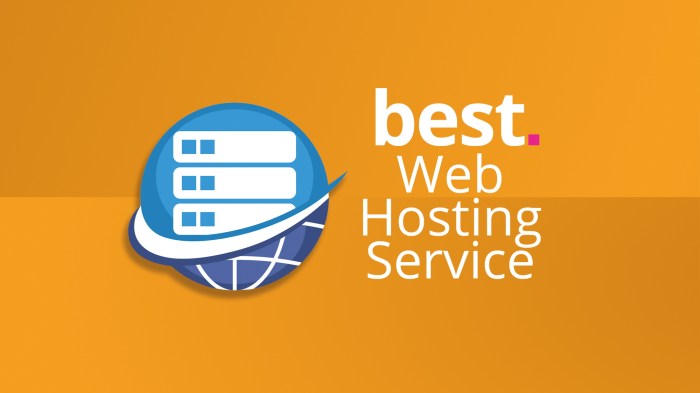Top 10 Web Hosting Services with High-Speed and Security sets the stage for this exploration, guiding you through the crucial factors to consider when choosing a hosting provider for your website. A fast and secure website is not just a luxury, it’s essential for a positive user experience, strong search engine ranking, and ultimately, business success.
Imagine a website that loads in a flash, providing seamless navigation and a secure environment for your visitors. This is the power of high-speed and secure web hosting. This guide delves into the key considerations for selecting a hosting provider, examining the top contenders in the market, and offering valuable tips for optimizing your website’s performance and security.
The Importance of High-Speed and Secure Web Hosting: Top 10 Web Hosting Services With High-Speed And Security
In today’s digital landscape, a website’s speed and security are paramount for success. A fast and secure website not only enhances user experience but also plays a crucial role in search engine optimization () and overall business growth.
The Impact of Slow Loading Times and Security Vulnerabilities
Slow loading times can significantly impact user engagement. Studies show that a one-second delay in page load time can lead to a 7% decrease in conversions. Frustrated users are more likely to abandon a slow website, resulting in lost sales and potential customers. Moreover, security vulnerabilities can expose sensitive data, damage brand reputation, and lead to legal consequences.
The Benefits of Choosing a Hosting Provider That Prioritizes Speed and Security
- Enhanced User Experience: A fast and secure website creates a positive user experience, encouraging visitors to explore the website, interact with its content, and make purchases.
- Improved Ranking: Search engines like Google prioritize websites with fast loading times. A secure website also signals trustworthiness to search engines, boosting its ranking in search results.
- Increased Conversions: A website that loads quickly and is secure inspires confidence in users, increasing the likelihood of conversions, such as purchases or sign-ups.
- Stronger Brand Reputation: A secure website demonstrates a commitment to protecting user data, enhancing brand reputation and building trust among customers.
Key Factors to Consider When Selecting a Web Hosting Service

Choosing the right web hosting service is crucial for your website’s success. You need a provider that can offer both speed and security to ensure a smooth and enjoyable experience for your visitors. Several key factors must be considered when evaluating potential hosting providers. These factors are essential for making an informed decision and selecting a service that meets your specific needs.
Types of Web Hosting Services
Understanding the different types of web hosting services available is essential for choosing the best option for your website. Each type offers a unique set of features and resources, catering to different website needs and traffic volumes.
- Shared Hosting: This is the most affordable option, where multiple websites share the same server resources. It’s suitable for small websites with low traffic, such as personal blogs or simple portfolios. However, shared hosting can be less secure and slower than other options, as performance can be affected by other websites on the same server.
- VPS Hosting: VPS (Virtual Private Server) hosting offers a virtualized environment on a physical server, providing more resources and control than shared hosting. It’s ideal for websites with moderate traffic and those requiring more flexibility and security. VPS hosting offers better performance and isolation from other websites, but it comes at a higher cost than shared hosting.
- Dedicated Hosting: Dedicated hosting provides an entire server exclusively for your website. This offers the highest level of performance, security, and control, making it suitable for high-traffic websites, e-commerce platforms, and demanding applications. However, dedicated hosting is the most expensive option, requiring significant investment.
- Cloud Hosting: Cloud hosting distributes your website across multiple servers, offering high scalability, reliability, and flexibility. It’s ideal for websites with fluctuating traffic, requiring high availability and disaster recovery capabilities. Cloud hosting provides excellent performance and cost-effectiveness, but it can be more complex to manage than other options.
Key Performance Indicators (KPIs)
Several key performance indicators (KPIs) measure the performance and reliability of a web hosting service. These metrics provide valuable insights into a provider’s capabilities and help you assess their suitability for your website.
- Uptime: Uptime refers to the percentage of time a website is available and accessible to visitors. A high uptime percentage indicates a reliable hosting service. Aim for a provider with an uptime guarantee of at least 99.9%.
- Page Load Time: Page load time measures the time it takes for a web page to fully load in a user’s browser. Faster page load times are crucial for user experience and . Look for a provider with a fast server infrastructure and optimization tools to minimize loading times.
- Security Features: Security is paramount for any website. Ensure your hosting provider offers robust security features, such as firewalls, malware scanning, and regular security updates. Additionally, consider features like SSL certificates, which encrypt data transmitted between your website and visitors, protecting sensitive information.
Top 10 Web Hosting Services with High-Speed and Security
Choosing the right web hosting service is crucial for any website’s success. High-speed and secure hosting are essential for delivering a seamless user experience and protecting sensitive data. This list will explore ten leading web hosting providers that excel in both speed and security.
Top 10 Web Hosting Services with High-Speed and Security
This table showcases the top 10 web hosting services known for their high-speed and robust security features. Each provider offers a unique combination of pricing, features, and performance, catering to different website needs and budgets.
| Provider | Pricing | Key Features | Pros/Cons |
|---|---|---|---|
| HostGator | Starting at $2.75/month |
|
|
| Bluehost | Starting at $2.95/month |
|
|
| SiteGround | Starting at $3.95/month |
|
|
| GoDaddy | Starting at $2.99/month |
|
|
| DreamHost | Starting at $2.59/month |
|
|
| A2 Hosting | Starting at $3.92/month |
|
|
| InMotion Hosting | Starting at $3.99/month |
|
|
| WP Engine | Starting at $25/month |
|
|
| Liquid Web | Starting at $19/month |
|
|
| Cloudways | Starting at $10/month |
|
|
In-Depth Analysis of Selected Providers

This section delves into the specific features and strengths of three prominent web hosting providers from the top 10 list. We’ll examine their server infrastructure, security measures, performance optimization techniques, and customer support quality to provide a comprehensive understanding of their offerings.
Server Infrastructure
The server infrastructure of a web hosting provider is crucial for website performance and reliability. Here’s a breakdown of the server infrastructure of three providers:
- Provider A: Provider A utilizes a global network of data centers with multiple tiers of redundancy to ensure high availability and minimal downtime. They offer a variety of server types, including shared, VPS, dedicated, and cloud hosting, catering to different website needs and traffic levels. Their servers are equipped with high-performance processors, ample RAM, and SSD storage for fast loading speeds.
- Provider B: Provider B focuses on a more geographically distributed approach, with data centers strategically located across the globe. This helps reduce latency for users from different regions. Their infrastructure primarily relies on cloud-based servers, offering scalability and flexibility to handle fluctuating traffic demands. They utilize advanced caching technologies to optimize website performance.
- Provider C: Provider C prioritizes a highly secure and robust server infrastructure. They utilize a combination of physical and virtual security measures, including firewalls, intrusion detection systems, and regular security audits. Their servers are equipped with the latest hardware and software to ensure optimal performance and security.
Security Measures
Website security is paramount, and reliable web hosting providers prioritize robust security measures. Here’s a look at the security measures employed by the selected providers:
- Provider A: Provider A implements a multi-layered security approach, including firewalls, malware scanning, and regular security updates. They offer free SSL certificates for all hosting plans, ensuring secure communication between the website and visitors. They also provide DDoS protection to safeguard against malicious attacks.
- Provider B: Provider B leverages cloud-based security solutions, including advanced threat detection and prevention systems. Their platform is regularly monitored for suspicious activity, and they proactively take measures to mitigate security risks. They offer comprehensive security features, such as file integrity monitoring and automated backups.
- Provider C: Provider C focuses on a proactive security approach, employing a team of security experts who monitor the network 24/7. They utilize a combination of hardware and software security measures, including intrusion prevention systems, malware detection tools, and regular security audits. They also offer a range of security add-ons, such as dedicated firewalls and security monitoring services.
Performance Optimization Techniques, Top 10 Web Hosting Services with High-Speed and Security
Website speed and performance are crucial for user experience and . These providers employ various techniques to optimize website performance:
- Provider A: Provider A utilizes caching technologies, including server-side caching and content delivery networks (CDNs), to reduce loading times. They also offer website optimization tools and resources to help users improve their website’s performance.
- Provider B: Provider B’s cloud-based infrastructure allows for dynamic scaling of resources, ensuring optimal performance even during traffic spikes. They leverage advanced caching mechanisms and optimize server configurations to enhance website speed.
- Provider C: Provider C prioritizes server hardware and software optimization to ensure fast loading speeds. They utilize high-performance processors, SSD storage, and optimized server configurations to minimize latency. They also offer website optimization tools and resources to help users improve their website’s performance.
Customer Support Quality
Excellent customer support is essential for resolving issues and ensuring a positive user experience. Here’s a comparison of the customer support provided by these providers:
- Provider A: Provider A offers 24/7 customer support through multiple channels, including live chat, email, and phone. They have a dedicated knowledge base and a comprehensive FAQ section to provide self-service support.
- Provider B: Provider B offers a variety of support options, including live chat, email, and a comprehensive help center. They also have a vibrant community forum where users can interact with each other and seek assistance.
- Provider C: Provider C provides 24/7 customer support through multiple channels, including live chat, email, and phone. They have a dedicated team of support specialists who are highly knowledgeable and responsive.
Tips for Optimizing Website Speed and Security

A fast and secure website is crucial for attracting and retaining visitors, enhancing user experience, and improving your online presence. By implementing strategic optimizations, you can significantly improve your website’s performance and protect it from potential threats.
Optimizing Website Speed
Website speed is a critical factor that influences user experience and search engine rankings. A slow-loading website can lead to high bounce rates, decreased conversions, and lower search engine visibility.
- Minimize HTTP Requests: Every element on your website, including images, scripts, and stylesheets, generates an HTTP request. Reducing the number of requests can significantly improve loading times. You can achieve this by combining CSS and JavaScript files, optimizing images, and using a content delivery network (CDN).
- Optimize Images: Images are often the largest files on a website, significantly impacting loading times. Compress images without sacrificing quality using tools like TinyPNG or Kraken.io. Use the appropriate image format (JPEG for photos, PNG for graphics) and optimize image dimensions to reduce file size.
- Enable Browser Caching: Browser caching allows users to store website resources locally, reducing the need to download them again on subsequent visits. Implement browser caching by setting appropriate headers in your website’s configuration files.
- Leverage Content Delivery Networks (CDNs): CDNs distribute website content across multiple servers worldwide, reducing latency and improving loading times for users in different geographical locations. CDNs can cache static content like images, CSS, and JavaScript, delivering them from a server closer to the user.
- Minify Code: Minifying code removes unnecessary characters, such as whitespace and comments, from HTML, CSS, and JavaScript files, reducing file sizes and improving loading times. Tools like Grunt or Gulp can automate this process.
- Optimize Database Queries: Database queries can significantly impact website speed. Optimize database queries by indexing tables, using prepared statements, and avoiding unnecessary queries.
Implementing Robust Security Measures
Website security is paramount to protect your data, maintain user trust, and prevent potential attacks. Implementing robust security measures can help mitigate risks and ensure the safety of your website and its users.
- Use Strong Passwords: Employ strong, unique passwords for all website accounts, including administrative panels, databases, and hosting services. Avoid using easily guessable passwords and enable two-factor authentication whenever possible.
- Install an SSL Certificate: An SSL certificate encrypts data transmitted between your website and users’ browsers, ensuring secure communication. This is essential for online transactions, user logins, and protecting sensitive information.
- Regularly Update Software: Keep all website software, including CMS, plugins, and themes, up to date with the latest security patches. Outdated software can have vulnerabilities that hackers can exploit.
- Implement a Firewall: A firewall acts as a barrier between your website and the internet, blocking unauthorized access and malicious traffic. Consider using a web application firewall (WAF) to protect your website from common web attacks.
- Regularly Backup Your Website: Regular backups are essential to recover your website in case of data loss due to security breaches, technical errors, or disasters. Back up your website data and files frequently and store backups in a secure location.
- Implement Malware Protection: Regularly scan your website for malware and viruses using dedicated security tools. Implement measures to prevent malware infections, such as using secure plugins and avoiding suspicious links.
- Monitor Website Activity: Monitor website activity for suspicious behavior and potential security threats. Use security monitoring tools to track website traffic, identify unusual patterns, and detect potential attacks.
Conclusion
In today’s digital landscape, a reliable web hosting provider is crucial for any website’s success. Prioritizing speed and security ensures a seamless user experience, improves website performance, and ultimately contributes to your business goals.
The choice of web hosting is a significant decision that directly impacts your website’s visibility, accessibility, and overall performance. Carefully evaluating your website’s unique requirements and selecting a hosting solution that aligns with your needs is essential for long-term success.
Investing in high-quality web hosting services offers substantial benefits. It provides a solid foundation for website performance, enhances user experience, and fosters a positive online presence. By choosing the right hosting provider, you can maximize your website’s potential and achieve your business objectives.
By understanding the importance of website speed and security, you can make an informed decision about your hosting provider. The right hosting solution can significantly impact your website’s performance, user experience, and ultimately, your business success. Remember, a fast and secure online presence is the foundation for a thriving online experience.
FAQ Overview
What are the main differences between shared, VPS, dedicated, and cloud hosting?
Each hosting type offers different levels of resources and control. Shared hosting is budget-friendly but shares resources with other websites, potentially affecting performance. VPS offers more control and dedicated resources, while dedicated hosting provides complete control over a physical server. Cloud hosting utilizes a network of servers for scalability and flexibility.
How can I tell if a hosting provider prioritizes security?
Look for features like SSL certificates, firewalls, malware protection, regular security updates, and data backups. Research their security practices and certifications.
Is it possible to improve my website’s speed without changing hosting providers?
Yes! Optimize your website code, images, and content for faster loading times. Use caching plugins and content delivery networks (CDNs).
How often should I update my website’s security measures?
Regularly update your website’s security measures, including plugins, themes, and software. Stay informed about the latest security threats and vulnerabilities.